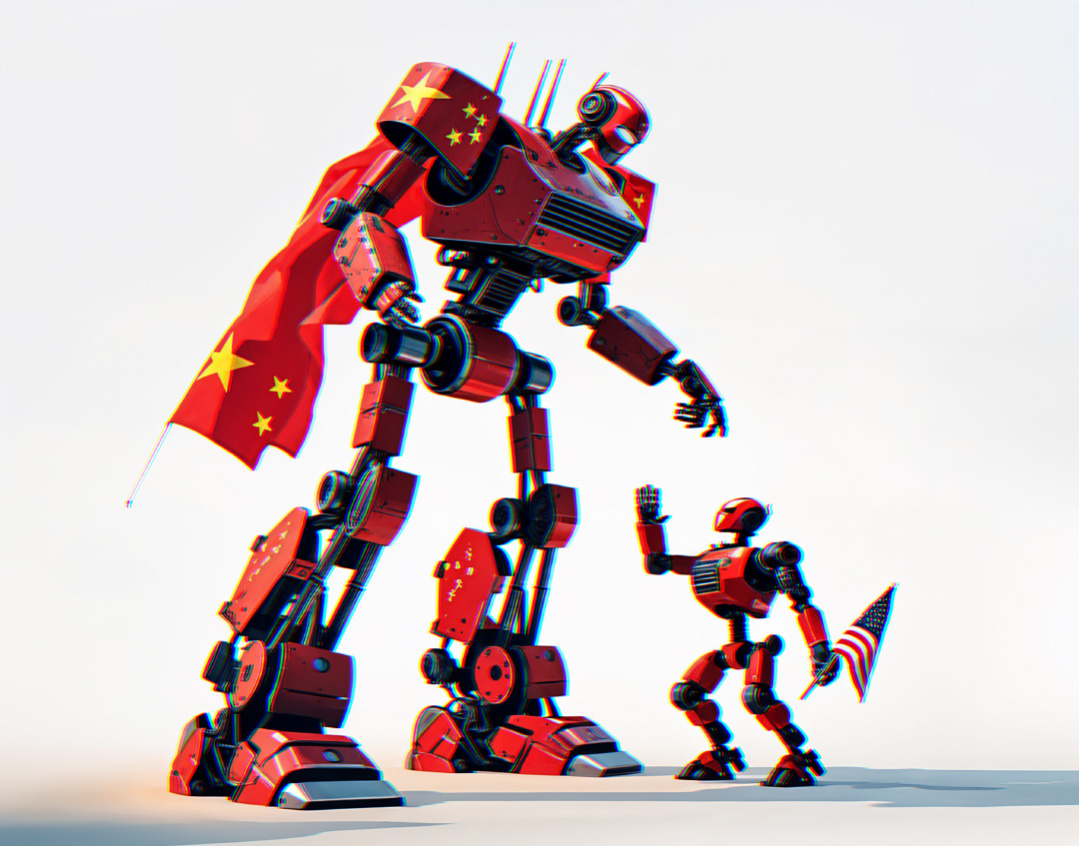Deep Trouble
| February 4, 2025China's new DeepSeek AI poses a strategic challenge to the US tech industry

IN the fast-moving world of technology, it should be unsurprising that a little-known company could upend markets and geopolitics in a matter of days. Even so, the advent of Chinese company DeepSeek on the artificial intelligence scene marks a new chapter in this accelerated race.
After years of market domination by a handful of American big tech giants, DeepSeek seems to have achieved results on par with OpenAI’s ChatGPT, using less sophisticated technology, at a fraction of the price. All this while seemingly running circles around a set of Biden administration regulations intended to impede China’s AI progress.
Venture-capitalist Marc Andreessen won the narrative-framing contest, labeling it a “Sputnik moment” — a reference to the Soviet satellite that spurred the US to get serious with its space program. President Donald Trump called DeepSeek a “wake-up call” to America.
With DeepSeek’s rapid success spurring many to question the wisdom of American attempts to stymie global AI challenges, the question remains: Is the company’s achievement as dramatic as it has been made out to be? And how should the United States respond?
The AI Breakout
Artificial intelligence entered the wider public consciousness in 2023. When OpenAI’s ChatGPT became easily accessible, many users were simultaneously intrigued and frightened by the experience of interacting with a computer program that convincingly mimicked an extremely knowledgeable human being.
More alarming were warnings from the very innovators who developed and financed this technology. They cautioned that advanced AI posed “profound risks to society and humanity.” A statement from another group that included Bill Gates and OpenAI CEO Sam Altman warned that “mitigating the risk of extinction from AI should be a global priority, alongside other societal-scale risks such as pandemics and nuclear war.”
Amid talk of threats straight out of science fiction, like robots ganging up against mankind, a group of leading AI figures, including Elon Musk (then still merely an eccentric tech mogul), called for a six-month development pause so industry and government leaders could assess risks and implement guardrails.
The Biden White House rolled out an AI Bill of Rights, and Congress introduced several pieces of regulatory legislation. The European Union released a list of regulations that many urged the US to follow. President Trump subsequently undid many of the Biden administration’s regulations, claiming they hindered development, giving foreign competitors an advantage.
Yet even developers’ calls for pauses and regulation were viewed skeptically by some who saw them as chiefly intended to stifle competition from smaller companies. Some of those views seemed validated as OpenAI, Llama, and other tech giants came to dominate the field.
The public got used to the existence of “intelligent” chatbots, and various sectors increasingly incorporated AI technology into operations. Attention turned to securing America as the world’s AI leader.
A year before the ChatGPT breakout, the CHIPS Act, a bill that passed Congress with significant bipartisan support, allotted hundreds of billions in funding to American semiconductor developers. The Biden administration placed heavy restrictions on chip sales to China, with the expressed intention of handicapping its ability to compete in the AI race. Flush with abundant government and private investment, American tech tycoons bragged that they were comfortably ahead in this contest.
"Cat's Out of the Bag"
DeepSeek’s dramatic entrance onto the AI stage upends both US policy making and the illusionary laurels Silicon Valley bestowed on itself.
“This whole approach was based on a few people controlling the narrative and others drinking the Kool-Aid that AI has to be expensive, and that chips are everything,” said Anshumali Shrivastava, professor of computer science at Rice University and founder of ThirdAI, billed as a “cost-effective” AI platform. “Now, the cat’s out of the bag.”
Experts say that DeepSeek’s performance rivals those of ChatGPT and other far more expensive US-based models. The Chinese company said its program cost less than $6 million and used some 2,000 chips made by California-based producer Nvidia. American competitors’ products cost over $100 million and use over 10,000 chips.
In less than two weeks of its release, DeepSeek outstripped ChatGPT’s user popularity and sent tech companies into a financial tailspin, erasing $1 trillion in stock value, with Nvidia taking a big hit. Yet within a few days, much of that value had been regained, and the market stabilized.
Some questioned whether DeepSeek’s achievement was as seismic as it appeared.
“It’s a Sputnik moment somewhat, in that it shocked people and sparked a national discussion, but it’s too early to tell if the Chinese really caught up,” said Adam Segal, an expert in emerging technologies for the Council on Foreign Relations.
ChatGPT CEO Sam Altman initially complimented DeepSeek on its innovation, but a few days later, he accused it of being built on information stolen from his own large language model (LLM).
Dr. Segal said the company definitely threw common assumptions into question. “Until three weeks ago, most people would have told you that the US is far ahead and will continue to be, and that our export policies slow down China,” he said. “Now, we’re not as far ahead as we thought, and it looks like the controls aren’t working.”
Orient Express
DeepSeek is the brainchild of Liang Wenfeng, 39, a computer scientist who founded a tech hedge fund in 2015. It met with great success, and in 2023, he formed the group that would go on to create DeepSeek. Mr. Wenfeng worked with a small team, mostly students and recent graduates, who he said would have more creativity, a drive to prove themselves, and total dedication to the project. Experts said that a patriotic spirit and desire to work around US chip restrictions were added incentives.
The Chinese government played a role in producing AI talent. In 2017, it announced its intention to become a world AI leader by 2030 and to release “world-leading” technologies by 2025. Working toward those goals, in 2022 China’s Ministry of Education approved 440 universities to offer degrees focusing on AI. A report by Georgetown University the same year said that about half of leading AI researchers were Chinese, as opposed to 18% who were American.
DeepSeek is a privately owned company, but in China, that hardly precludes government intervention.
“The Chinese [Communist Party] can still come in and call the shots, and all Chinese AI companies go through an approval process where they agree to uphold socialist values,” said Dr. Segal.
Chinese state regulations dictate that once a company’s activities are deemed important for national security, Beijing can largely take over its direction.
American users quickly detected some obvious pro-Chinese controls put on DeepSeek, such as its refusal to answer questions about the 1989 Tiananmen Square demonstrations. That gave rise to concerns the LLM was likely wired to promote other CCP-favored narratives as well.
Other concerns include China using DeepSeek’s advancements for military applications. A more immediate concern is China exploiting a surge in new American users to harvest data. Downloading DeepSeek and running it locally should protect user information, but hosted versions lack that security.
“All that data is funneled right back to China, and the government has full access,” said Dr. Segal.
What Now?
China proudly boasted about how American export controls served as the proverbial mother of invention, forcing its tech elite to do more with less, yielding a more efficient LLM.
“Trying to curb technological development by restricting hardware is like trying to dam a large river while overlooking the countless streams that feed it,” read a piece in the Global Times, an outlet run by the Chinese Communist Party.
The company’s success sparked debate as to how to evaluate past attempts to control AI development and what should be done going forward.
A commonly heard critique was that DeepSeek’s success exposed the ineffectiveness of the Biden administration’s policy.
“You’re not going to do this with chips,” said Professor Shrivastava. “The faster way to build is with algorithms. This has more to do with brains than chips.”
Taking that line, some argued the only effective tools are policies and grants that spur faster US development, including slashing regulations.
“It doesn’t make sense to limit ourselves if the Chinese will not do the same,” said Dr. Segal. “China has some regulations, and we could have discussions with them, but there’s a legitimate worry about trusting the Chinese government.”
Others said that while DeepSeek revealed the limits of export controls, its release (which took place on Inauguration Day) and China’s messaging around it might be underhanded attempts to convince the US to open the chips market and drop what, in reality, is still a significant advantage. In July of last year, DeepSeek founder Mr. Wenfeng told a Chinese interviewer, “The problem we face has never been money, but the ban on high-end chips.”
Another camp blamed loopholes in the Biden administration’s policy that permitted chips sales for training systems in a cloud. That sentiment moved Republican congressman John Moolenaar, who chairs the House select committee on the CCP, to call for stronger controls on technology sales to China.
Howard Lutnick, the Trump administration’s nominee to serve as secretary of commerce, said at a confirmation hearing that DeepSeek’s success showed the need for export controls to be “backed by tariffs.”
“I’m not sure you can say the controls were a mistake,” said Dr. Segal. “It’s a little early to say how successful they were. Number one, it takes a while to control chips — they were still able to train on old ones. And even though this model might be powerful, chip control might still make it harder to use and diffuse on the whole economy.”
A Real Open AI?
At the epicenter of DeepSeek’s impact in the US is the message to the tech economy and government policy makers. The wide attention focused on the company came as President Trump announced a $500 billion joint tech company venture called Stargate, intended to serve as the vanguard of American AI development. Funds will be supplied by private companies, but deregulation and other federal support are seen as essential to the program, which the president touted as the “largest AI infrastructure project in history.”
“If China can do this with lower energy and fewer chips, that certainly calls into question why Stargate needs so much money,” said Dr. Segal.
Stargate’s three major partners are leading tech firms OpenAI, SoftBank, and Oracle.
Professor Shrivastava said that the true “Sputnik moment” of DeepSeek’s advent is the message it holds for investors and small companies.
“A lot of people said, ‘Don’t even think about AI if you don’t have $100 million,’ but now, that’s getting a lot of scrutiny,” he said.
That might also threaten a small club of big tech players.
“People on the ground saw this coming because companies were making better models and cost kept coming down,” said Professor Shrivastava. “It’s an awakening for CEOs and other people who were pouring huge money into AI without thinking. If costs keep going down, AI won’t remain a monopoly held by a few people. This could be a democratization of AI.”
(Originally featured in Mishpacha, Issue 1048)
Oops! We could not locate your form.







